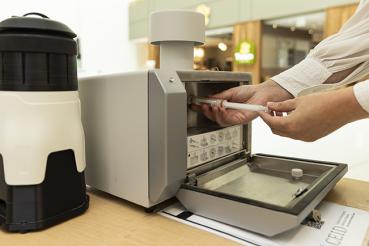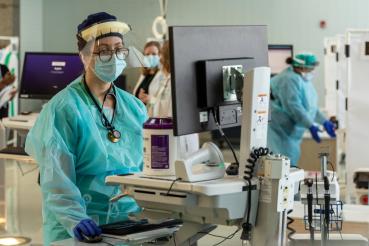I am the director of Infection Prevention and Accreditation at Rush, a nurse and a mom of two little girls, 1 and 4. I have spent the last five years navigating two unpleasant (but ultimately rewarding) pregnancies, raising newborns to infants to toddlers to “threenagers” and beyond (phew!), as well as ending up in a spot I never expected to be in: somehow making it to nursing a 1-year-old. I have also been working, but that seems to somehow be easier than my 5-to-9.
It is difficult being a professional mom. It is difficult to find the daily reward when you are tired, navigating through a career, answering sick calls from daycare, planning dinner and rushing through bedtime. But it is extraordinarily rewarding when your hard work pays off both personally and professionally, albeit with some push and pull.
Unique perspective
Nursing a child is a very polarizing component of this fluid equation. When it works, it’s easy. When it doesn’t, it’s remarkably hard, because whatever issue presents itself needs to be immediately addressed and resolved for the sake of both mom and baby, unless you want an even bigger problem on your hands. Nursing means handing yourself over to someone else and accepting all the good and bad, the snuggles and discomfort that go along with it. Also, though I selfishly acknowledge, the pool of commiserators and troubleshooters tends to be small — a handful of professionals and nursing moms — and it will ultimately end up being, as it did for me, your own journey.
As a former NICU nurse and certified infection preventionist, I had the unique perspective of being keenly aware of the power of breast milk to a baby. Even in the littlest amounts, it has benefits of helping proliferate a healthy oral and gut microbiome and being the easiest tolerated source of nutrition for babies.
As your child grows, your milk composition will adjust to contain more of what your baby needs it, less of what she doesn’t — both nutritionally and by volume. It also has accurately been considered a “miracle cure” of motherhood lore for ages — being effective for common baby issues like a gooey or pink eye and eczema. But even more remarkable is that through nursing, a mother is passing precious components of her own immune system to that of her growing baby. Nursing a baby means providing her with antibodies to a variety of infections you as a mom may have had or been immunized against. And on top of it all, breast milk has been found to contain active COVID-19 antibodies in recovered mothers.
'Extraordinary quality'
This extraordinary quality of breast milk is why I chose to vaccinate. I trust the emergency use authorization for the vaccines. I know that the Pfizer vaccine has gone through at least 44,000 participants and three phases and ended with a 95% efficacy against infection. I also know that quite honestly, this efficacy is better than many of the vaccines we take without blinking an eye. I know that my body will make antibodies, the protective immune component, to COVID-19 spike proteins, protecting me from illness and as previous studies suggest, passing them onto my baby.
I am comforted by the fact that both the Pfizer and Moderna vaccines are supported for use in pregnant and lactating women by the American College of Gynecology, a national physician association for obstetricians and gynecologists providing guidance and recommendation for women’s health care, who state that the theoretical risks are well outweighed by the benefit of vaccination. This is further supported by the American Academy of Pediatrics, which acknowledges that while lactation wasn’t selected for in clinical trials, the vaccine’s mechanism of action does not suggest it would be harmful to a nursing baby. Furthermore, the Advisory Committee on Immunization Practices, a committee through the Centers for Disease Control and Prevention comprised of medical and public health experts that provide guidance and recommendations for the safe use of vaccines in the U.S. population, has also supported vaccinating lactating women if they wish to do so.
Parents keep hearing that children “have an easier course” with COVID-19. This seems to be the underhanded compliment of the pandemic because even if that is contextually true, no parent wishes to see their child struggle with illness no matter how “mild” it is hoped to be, save the fact that your child’s illness still means time off of work as well as walking the tightrope of keeping the rest of the house COVID-free.
'I couldn't wait to get the vaccine'
What is unfortunately not considered in this underhanded compliment is a rare post-COVID-19 complication called multisystem inflammatory syndrome in children (MIS-C), a systemic inflammatory syndrome capable of causing severe multisystem dysfunction and even death, requiring hospital admissions, specialized therapies and treatments, and life-sustaining medical equipment weeks after recovery from their COVID-19 illness. My heart goes out to the parents who have hoped their children would take this “easier course” only to be hit by the atomic bomb of MIS-C. I personally feel empowered in even thinking that I could be helping my baby *maybe* avoid COVID-19 and its insult-to-injury counterpart of MIS-C.
Truthfully, vaccinating for me was never a question of “if” but “when.” I couldn’t wait to get the vaccine for my and potentially my baby’s health. I feel like I could be providing my child the potential benefit of something that will unfortunately not be available for other children under 16 for a while — a vaccine that is approved for use in this population. The two current vaccines under an emergency use authorization are approved for individuals aged 16 years and older. There are currently trials under way for children 12 years old and older but those for younger ones seems to be a ways-away. Nursing passes my antibodies against COVID-19 to my baby, *hopefully* offering her some benefit. Ultimately, in this time of massive flux in our personal, social, professional lives and otherwise, I feel like I am doing myself and my family a little favor by helping keep our house a little safer.




